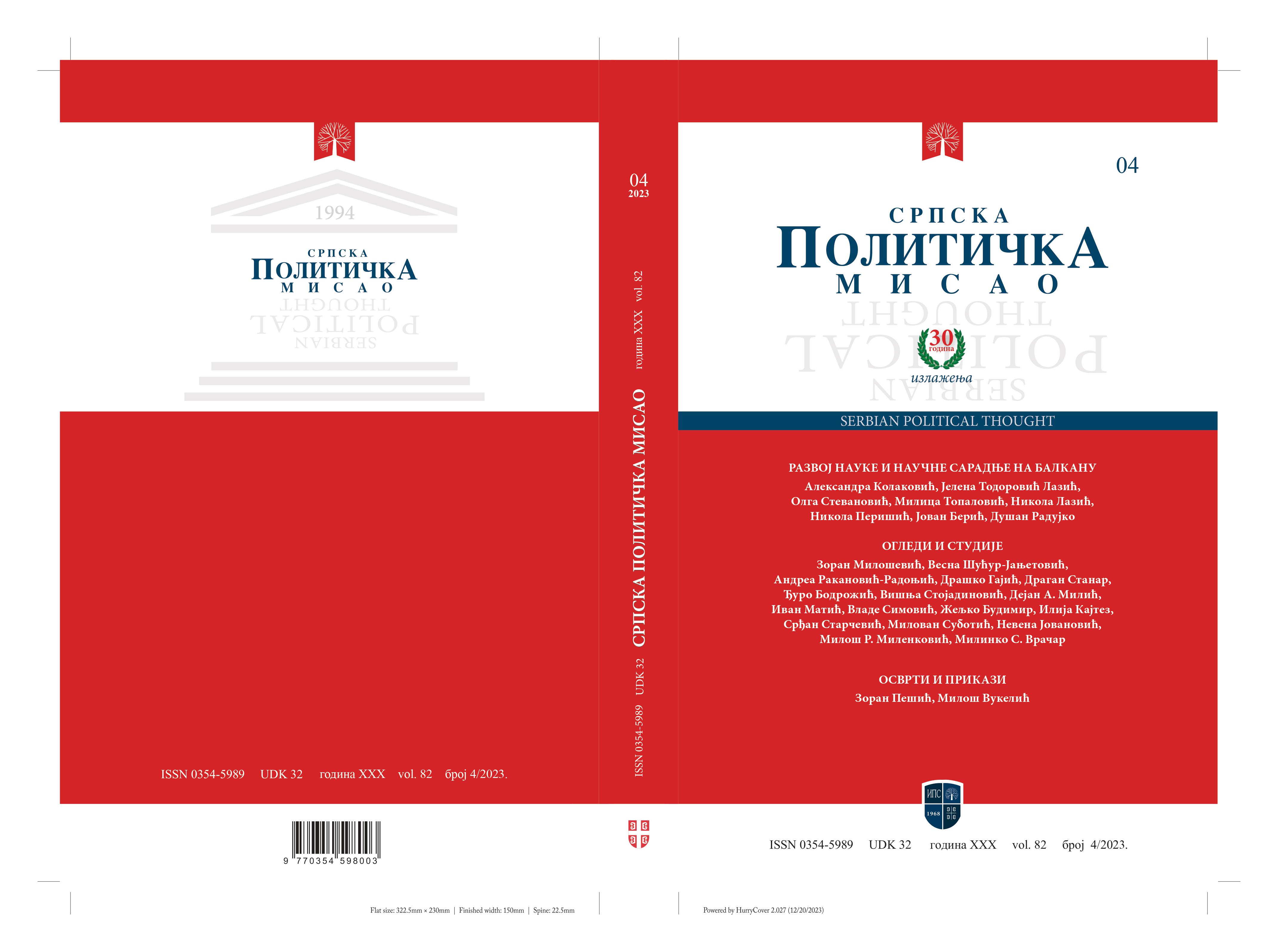ЛЕГИТИМНОСТ КАО ФАКТОР ОГРАНИЧЕЊА ПОЛИТИЧКЕ КОРИСНОСТИ ВОЈНЕ МОЋИ
Sažetak
Сажетак
У постхладноратовском добу, прожетом снажним утицајима глобализације и информационе револуције, уочава се да војна моћ не успева да оствари политичке ефекте који се од ње очекују, или бар оне које је некада могла. Један од разлога зашто је то тако аутори проналазе у дефициту њене легитимности, која ће у раду бити разматрана из три угла. Најпре, легитимност ће бити сагледавана кроз однос јавног мњења према употреби силе, затим, кроз питање легалности употребе силе као изворa њене легитимности и, последње, кроз анализу врста и карактера рата. Ово питање добија на значају јер се сврха војне моћи огледа у њеној политичкој корисности. Разматрајући утицај питања легитимности на делотворност употребе силе, аутори долазе до закључка да успех држава у наметању сопствене воље противнику више није примарно заснован на њиховој војној моћи, бар не у мери како је то било раније, већ на њиховој одлучности и способности да војну моћ комбинују са другим врстама националне моћи.
Reference
РЕФЕРЕНЦЕ
Baylis, John, James Wirtz, Colin S. Gray, Eds. 2013. Strategy in the Contemporary World: An Introduction to Strategic Studies, 4th Edition. Oxford University Press.
Clark, Wesley K. 2001. „Waging Modern War, Kosovo and the Future of Conflict“. Public Affairs. New York
Felter, Joseph H. and Jacob N Shapiro. 2017, „Limiting Civilian Casualties as Part of a Winning Strategy: The Case of Courageous Restraint“. Daedalus, 146 (1): 44–58.
Fukujama, Frenisis. 2002. Kraj istorije i poslednji čovek, Podgorica: CID
Ganzer Danijel. 2019. Protivzakoniti ratovi: Kako zemlje NATO podrivaju Ujedinjene nacije. Beograd: Laguna
Gray, Colin S. 2005. „Haw Has War Changed Since the End of the Cold War?“, Parameters Sprng: 14-26.
Hybrid warfare [HW]: A new phenomenon in Europe‘s security environment. 2015. Jagello 2000 for NATO Information Centre in Prague
Kreveld, Martin van. 2010. Transformacija rata, Beograd: Službeni glasnik i Fakultet bezbednosti
Lasica, Daniel T. 2009. Strategic Implications of Hybrid War A Theory of Victory, Fort Leavenworth: US Command and General Staff College.
Lebovic, Jemes H. 2010. The Limits of U.S. Military Capability: Lessons from Vietnam and Iraq. The Johns Hopkins University Press
Levy, Yagil. 2010. „The Second Lebanon War: Examining Democratization of War Theory”. Armed Forces and Society: Vol. 36, No. 5: 786-803.
McMahan, Jeff. 2009. Killing in War. Oxford: Clarendon Press
Milenković, Miloš R. 2019. „Prilog određenju političkih činilaca strateške kulture“, Vojno delo 71 (8): 52-72. doi:10.5937/vojdelo1908052M
Milenković, Miloš R., i Milinko Vračar. 2022. „Politička korisnost vojne moći u savremenim međunarodnim odnosima.“ Politička revija 71 (1): 157-175. doi: 10.22182/pr.7112022.8
Milenković, Miloš R., i Milovan Subotić. 2017. „Nasilni nedržavni akteri i pozicija Srbije.“ Srpska politička misao 57 (3): 55-70. doi: 10.22182/spm.5732017.3
Miršajmer, Džon. 2017. Tragedija politike velikih sila. Izmenjeno i dopunjeno izdanje, Beograd: Čigoja štampa
Mitrović, Miroslav, i Nebojša Nikolić. 2022. Hibridni rat: doprinos definisanju koncepta, sadržaja i modela delovanja. Beograd: MC Odbrana
Naj, Džozef S. 2004. Paradoks američke moći: Zašto jedina svetska sila ne može sama. Beograd: BMG
Naj, Džozef S. 2012. Budućnost moći. Beograd: Arhipelag,
Povelja Organizacije Ujedinjenih nacija [UN Charter]. 1945. https://www.un.org/en/about-us/un-charter/full-text
Reichborn-Kjennerud, Erik and Cullen Patric. 2016. „What is Hybrid Warfare?“. Policy Brief (1). Norwegian Institute of International Affairs
Stanar, Dragan. Ž. 2019. Pravedan rat – između apologije i obuzdavanja rata. Beograd: Bratoljublje
Stanar, Dragan. 2022. „Politička pobeda u ratu: oružane snage i sindrom ’izgubljene pobede’.“ Srpska politička misao 77 (3): 119-135. doi: 10.22182/spm.7732022.6
Starčević, Srđan, i Srđan Blagojević. 2017. „Kreveldov spor sa Klauzevicem – Da li je smisao rata politički?“ Srpska politička misao 56 (2): 117-134. doi: 10.22182/spm.5622017.7
Stojanović, Stanislav i Zoran Jeftić. 2014. „Savremeni svet i strategijska misao“. U: Sadržaj bezbednosnih izazova Srbije na početku 21. veka, Beograd: Inovacioni centar Fakulteta bezbednosti
Šar, Pol. 2020. Vojska bez vojnika: autonomno oružje i budućnost ratovanja. Beograd: Laguna
Volzer, Majkl. 2010. Pravedni i nepravedni ratovi: moralni argument sa istorijskim primerima. Beograd: Službeni glasnik
Vračar Milinko, Jovanka Šranović. 2018. „Transformacija rata na razmeđu 20. i 21. veka.“ Srpska politička misao 60 (2): 135-153 doi: 10.22182/spm.6022018.8
Vračar, Milinko i Vangel Milkovski. 2020. „Sveobuhvatna odbrana i strateška kultura kroz prizmu čoveka.“ Vojno delo 72 (4): 251-258. doi: 10.5937/vojdelo2004234V
Vračar, Milinko S. 2019. „Fizionomija rata u postmoderni: Studija slučaja sirijskog oružanog sukoba.“ Međunarodni problemi LXXI (4): 447-475. doi: 10.2298/MEDJP1904447V
Warden, John. 1995. „The Enemy as a System“. Airpower Journal, Vol. IX, No. 1, Spring.
Wijk, Rob de. 2002. „The Limits of Military Power“. The Washington Quarterly (Winter)
Zaman, Rashed Uz. 2009. „Strategic Culture: A Cultural Understanding of War“. Comparative Strategy, 28:1. Routledge, Taylor & Francis Group

